Kwantlen student’s appeal supremely dismissed
April 18, 2010 by Kirk Darbyshire · Leave a Comment
It was a harsh math lesson this week for a Kwantlen student, whose bid to have his driving suspension reduced was denied by a B.C. Supreme Court.
Ali Maasoumian had his driver’s licence suspended for eight months by the Superintendent of Motor Vehicles after he accumulated 17 points by the end of 2008.
Prior to the start of that suspension, the superintendent noted that he had accumulated another eight points in a nine-week span and so extended the ban by six months.
Maasoumian requested a review of his second suspension because of the hardships not having a driver’s licence placed on him. These hardships include not being able to drive to North Vancouver where he takes care of his father’s property and increasing his commute to school from a 25-minute drive to an hour-and-a-half commute on public transit.
“I am satisfied that the hardship which is put forward is not a hardship that I should take into account,” wrote Justice Grant Burnyeat.
“Having a driver’s license and being able to operate a vehicle is not a right. Rather, it is a privilege.”
Soccer team looks to add new players
March 12, 2010 by Kirk Darbyshire · Leave a Comment
The Kwantlen men’s soccer team is holding three talent identification sessions next week in the hope of finding quality players to add to the roster for next season.
“Evaluations are open to anyone who contacts me showing their interest in joining Kwantlen,” said Ajit Braich, head coach of Kwantlen’s men’s soccer team.
“Players should attend as many of the three sessions as possible. We need to see the players in a group setting.”
Sessions will be held off-campus at the South Surrey Athletic Park on Monday, March 15; Wednesday, March 17; and Friday, March 19. All training sessions will run from 6:30-8:30 p.m..
“The number of returning players will greatly depend on the turn out and quality of the evaluation camps,” said Braich.
Anyone interested must contact Braich at msoccer@kwantlen.ca prior to attending an identification session.
Eagles come up short against island hoops teams
January 29, 2010 by Kirk Darbyshire · Leave a Comment
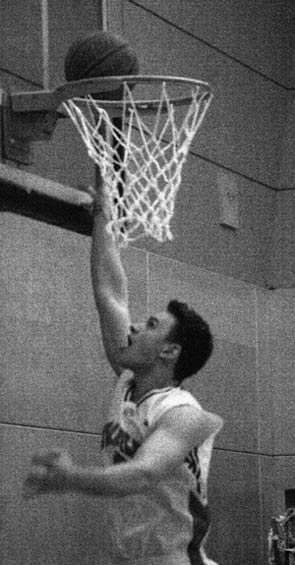
Brenden Graham of the Eagles dunks against Vancouver Island University in the mens basketball game being played now at the Surrey campus. (Katie Lawrence photo)
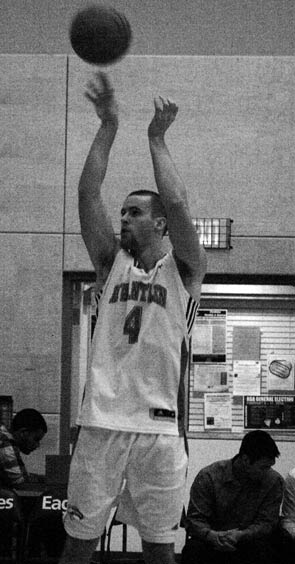
Kevin Kokoska of the Eagles shoots a jumper against Vancouver Island University. (Katie Lawrence photo)
On a night of celebration for Kwantlen soccer fans, the school’s basketball followers didn’t have much to cheer about.
Within hours of the raising of the Kwantlen soccer team banner to celebrate their national championship bronze medal Friday, the Eagles men’s team lost 94-68 to the Vancouver Island University (VIU) Mariners in their first home game since Nov. 7.
Despite Mike Davis’ 22 points, the game high, the Eagles couldn’t find a shooting rhythm. Both Lenny Piprah and Doug Meyers also pitched in, with 15 and 11 points.
Kwantlen fell behind early, but kept the game close, down 10 after the first quarter. But VIU started to pull away in the second and led 51-32 at the half. They outscored Kwantlen 43-36 in the second half, never losing the lead during the game.
VIU’s Mike Wohlers hit six three-pointers and led his team with 20 points in the game, while Andrew Kaban contributed with 15 and Jake Hayton had 14.
With that loss, Kwantlen fell to 10-13 on the year.

Jessica Williams shoots a free throw, as the Kwantlen Eagles were in tough against Vancouver Island University, Friday night in Surrey, losing 68-59. The game was live tweeted at www.twitter.com/ChronicleOnline. (Katie Lawrence photo)

Taminder Dhaliwal drives up court against Vancouver Island University Friday.
Women’s record falls to .500
The Kwantlen Eagles women’s basketball team came up short Friday night at home as the Mariners from Vancouver Island University defeated them 68-59.
The Eagles, who were led by forward Chantelle Doerksen’s 17 points, trailed from start to finish in a game that saw no lead changes. The largest spread in points came just before the half time break when VIU enjoyed a 19-point advantage over Kwantlen.
The Mariners leading scorer was guard Katherine Pearson who poured in 17 points of her own. As a team, VIU shot 36.5 per cent from the floor and went 13 for 18 from the free throw line.
VIU also enjoyed a decided advantage on points off turnovers, outscoring the Eagles 17-9 in that category.
The loss drops the Eagles record to an even .500 for the season, going 7-7 in league play, while the victory solidifies the Mariners position at the top of the BCAA league standings with a record of 10-2.
KSA program fee increases show up on tuition, five programs added
January 16, 2010 by Kirk Darbyshire · Leave a Comment
Many students may not have noticed when the KSA held a referendum last fall to add new programs by increasing the fees students pay. But after paying this semester’s tuition, many more will have.
Every fee increase voted on during the fall 2009 referendum was approved.
“We weren’t expecting all of them to pass,†said Steve Lee, the KSA’s director of finance, “so when all of them did, it made things more challenging in terms of what resources would go where for this year, while keeping to the commitment of ensuring that the total increase would not be more than 15 per cent of what we were already collecting.â€
That 15 per cent restriction means that only five of the programs approved by students will be implemented this year. None of the other fees approved will be added until the fall, but fees will be adjusted on an annual basis starting in the fall of 2010, and each subsequent September, until all of the approved programs are up and running.
The KSA chose which programs would be implemented first, based on a combination of which referendum questions received the most student support and which programs could most quickly be put in place, said Lee.
The five program fees that the KSA decided to add to this semester’s tuition include the sub fee, START volunteer program fee, REEBOOT program fee, intramurals fee and the clubs and events fee.
“REEBOOT was ready for implementation, as was START,†said Lee. “Events was a no-brainer, as that funding will help relieve pressure on our base budget.â€
Another one of the fee increases that will help the KSA’s bottom line in 2010 is the sub fee increase. According to Lee, that fee will help the KSA to meet the repayment schedule on a $1.6-million loan made by the student association in the late ’90s to help pay for the social areas of the recently renamed G-Building, the Surrey campus home to the gym, fitness centre, KSA offices and the Grassroots Café.
“The bulk of this (loan) has been paid back,†said Lee, “but there is still some money outstanding and our goal is to eliminate that debt as soon as possible.â€
Any money left over after the student association’s debt repayment will be banked and earmarked for a new Student Union Building in Surrey, as well as for student centres on the Richmond, Langley and Cloverdale campuses.
The START volunteer program is aimed at getting more students involved in the KSA through volunteer opportunities. The KSA will hire some students as volunteer coordinators and others will be able to gain experience volunteering around campus.
Students who have computers in need of repair will be able to take advantage of the KSA’s new REEBOOT program. The program will allow students to get computers and laptops serviced at a low cost.
The clubs and events program fee will be used by the KSA to offset money they are currently spending on events. This funding in 2010 will also go towards restoring the KSA staff position of events and clubs coordinator.
Students interested in athletics will be able to take advantage of the intramurals program, which will lead to intramural sport leagues. According to Lee, the intramurals program will be run in cooperation with the university, which has proposed matching the funds the KSA puts into the program dollar for dollar.
Kwantlen mascot needs a name
January 13, 2010 by Kirk Darbyshire · 1 Comment
The Kwantlen Eagles mascot is in need of a name and the athletics department is challenging students to come up with it, offering an iPod touch to the winner.
The mascot, which was designed by a collaboration of student opinions, is a giant eagle that has been nameless since its first appearance last September at a school sporting event.
“We feel that this is a great opportunity for students to get involved and show their school spirit,†said Katlyn Moore, Kwantlen’s athletic director.
The contest requires students to submit their suggested names to the athletic department web site before the Jan. 15 deadline. Once all the name ideas have been reviewed, the athletics department will post the 10 finalists on the Kwantlen website and students will be able to vote for their favourite.
“The response has been really good,†said Moore, who claims there have been over 60 unique names suggested already.
The winning name will be announced on Jan. 29 at the same time as the school raises the Kwantlen women’s soccer team’s championship banner in the Surrey gymnasium prior to both the men’s and women’s basketball games against Vancouver Island University.
Despite concerns, children ‘safe as ever’
January 12, 2010 by Kirk Darbyshire · Leave a Comment
The ways we keep children safe have changed from generation to generation, but nothing compares to the way today’s kids are monitored.
Events such as Richmond Centre Mall’s Halloween trick-or-treating for kids, which brought them off the street and into a supervised atmosphere to go store-to-store collecting candy, are becoming commonplace.
“I think events like mall trick-or-treating are crucial these days to making parents feel comfortable,†said Pamela Lau, a teacher at Small Talk Preschool in Vancouver. “It’s not like it used to be. Parents these days pay much closer attention to who’s watching their kids and even who’s watching the people watching their kids.â€
As a result of increased fear of abduction, preschools and daycares have adopted many new security measures. According to Lau, all children at her school must be signed in and out by both their approved parental guardians and one of the teachers.
Even though people’s fears continue to rise, Statistics Canada num-bers show no substantial increase in the number of Canadian children abducted by strangers over a 10-year period from 1997 to 2007.
During those 10 years, the average number of missing children cases filed with the RCMP yearly was 63,896, with an annual average of only 42 of those being kidnappings by strangers. That number makes up less than 0.001 per cent of all missing-children cases filed during that time period.
“I truly believe children are just as safe as they ever have been, maybe safer,†said Susan Jones, an earlychildhood educator at a downtown Vancouver children’s centre. “With the increased attention facilities pay to children’s safety today compared with 20 years ago, it would be much more difficult for a child of this generation to be taken, period.â€
Jones, who has worked in early childhood education for more than a decade, said she believes increased media coverage of every abduction, or even potential abduction, goes a long way to increasing concern.
In June, the RCMP warned Richmond parents that there was a potential kidnapping threat, and that the target was of elementary-school age and Asian descent. This warning was widely distributed through the media, even though the information the RCMP had obtained about the threat was minimal, according to a Vancouver Sun article.
“We completely understand it might instil fear in people but we want to get the message out to parents. I can’t see any other way this can be done,†Cpl. Jennifer Pound told the Sun.
The RCMP’s plan appears to have worked, because parents kept an even closer watch on their kids than usual, and there were not any kidnappings.
Every school in Vancouver has a school-liaison officer whose job it is to educate parents and students on dangers such as Internet luring and “stranger danger.â€
“We are very proactive with the youth in Vancouver, and work very closely with the Vancouver School Board,†said Const. Lindsey Houghton, media relations officer with the VPD.
Twenty years ago, police techniques for finding missing children included putting their pictures on milk cartons. These days, authorities have many new programs in place to help in the search.
One relatively new tool police utilize in the recovery of abducted children is the Amber Alert Program. The program, which was first used in the United States, was introduced in Alberta in 2002 and was Canada-wide by the end of 2005. Since its inception, there have been 29 Canadian Amber Alerts activated, including four in the last year.
In order for an Amber Alert to be issued by the RCMP, the abduction must first meet the program’s four criteria. Law enforcement must confirm that an abduction has taken place, the abducted child must be under 17 years of age and be at risk of death or serious injury, and there must be a sufficient description of the child, the captor and the captor’s vehicle.
Amber is a acronym based on the U.S.-program name: America’s Missing: Broadcast Emergency Response. Amber Alerts in both Canada and the U.S. are distributed via radio stations, cable TV, e-mail and electronic traffic-condition signs.
Travel costs drop as fear grows
January 12, 2010 by Kirk Darbyshire · Leave a Comment
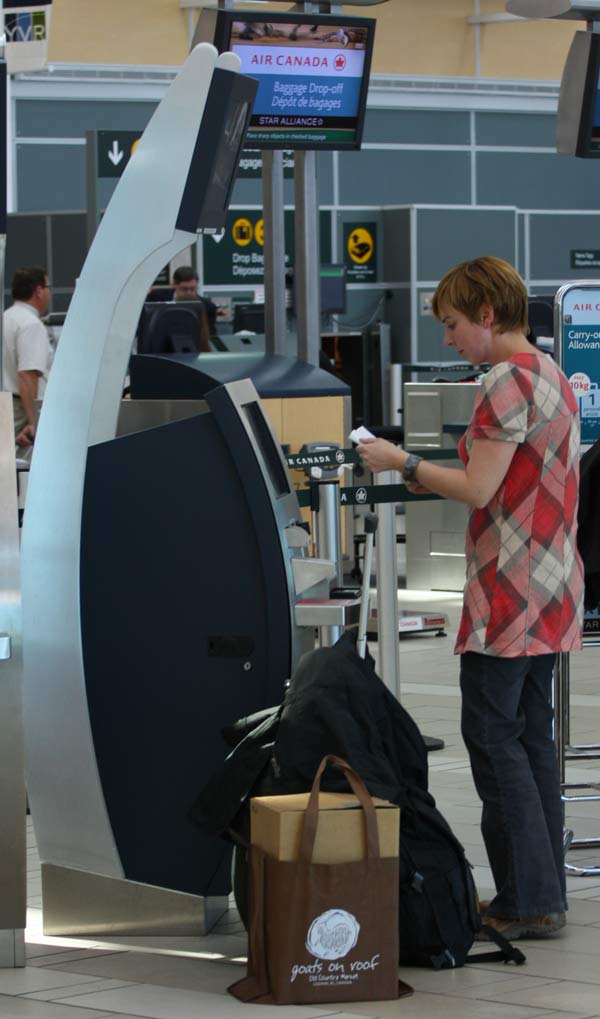
Amidst H1N1 fears, travelers are still lining up at airports to take advantage of the available travel discounts. (Kirk Darbyshire photo)
Students looking for sun and sand on a budget may be in luck this winter, but they shouldn’t forget to wash their hands.
“Southern destinations are always popular over the holiday season. Even this year, with the H1N1 scare, ticket sales are still very strong,†said Kyko Purvis, a travel agent with Merlin Travel. “It has a lot to do with the great deals available.â€
The Public Health Agency of Canada posted a level one advisory for travel globally because of the H1N1 flu, but has not specifically listed any country as an area of higher risk. The level one advisory is the lowest of three issued by the organization.
As a result of the H1N1 virus outbreak, most airlines, hotels and travel agents have sweetened their deals in an attempt to cash in on the lucrative holiday travel season. Room upgrades, seat upgrades, travel vouchers that cover the cost of your airfare when you book for a week-long stay at a resort, and transfers that will get you from the airport to your hotel for free are all perks being offered for those who are willing to ignore the travel advisories.
“People are weighing the risks to their health against the savings in their pocket-books,†said Purvis, “and booking their tickets, for most, is an easy choice.â€
Dr. Sarah Thrasher, of the Travel Medicine and Vaccination Centre, has seen an increase in people inquiring about the safety of travel to many destinations.
“I’ve been advising people the risk of travelling this year is relatively
no different then that of previous years,†said Thrasher.
Regular hand washing, using hand sanitizers, avoiding people with signs of respiratory illness and being vaccinated – once the vaccine is available to Canadians – are all ways of protecting yourself against H1N1 infection, said Thrasher. Canada has just over 50 million doses of the vaccine on order, and they should be available in early to mid-November. That’s enough for everyone in Canada who wants one to be vaccinated.
“H1N1 causes relatively moderate symptoms in those infected, so people don’t need to feel afraid to travel,†said Thrasher.
A tough road for Kenny: In the face of adversity, he doesn’t see his disability as a challenge
January 12, 2010 by Kirk Darbyshire · Leave a Comment

Ken Gabour goes through his regular workout at Richmond's Water Mainia training facility where, he works out four days a week. (Kirk Darbyshire photo)
Ken Gabour grimaces slightly as he lifts the dumbbell at Richmond’s Water Mania training facility. He then curls it up to his chest just as he’s done time and time again during his 20-year athletic career.
The winner of more than 30 B.C. Special Olympic medals has competed in nearly every sport, reaching the pinnacle in figure skating in 1996 by winning the World Special Olympic gold medal. Listening to Gabour tell the story, you’ll never hear the word special, just Olympic.
Gabour was born with Down Syndrome, Sept. 3, 1972 in Vancouver General Hospital. Down Syndrome is a chromosomal disorder caused by the presence of an extra 21st chromosome, resulting in a flat face and mental retardation.
He was also born partially deaf and with a hole in his heart that may have required open-heart surgery to fix. By the time he turned one, the hole had grown over and his life – growing up in a typical suburban Richmond family – could begin.
“Ken has never seen himself as different,†said Gabour’s mother, Dorothy, “and to tell you the truth, he doesn’t even like to hang out with other handicapped people.â€
What he does like to do is work out, hang out with friends and family, volunteer with many community programs, play all types of sports. And work at his long-time job with McDonald’s.
Gabour lives a full and rewarding life with his mother in a basement suite in Richmond, but it wasn’t always so easy. There was very little help for B.C. parents of children with developmental delays prior to the establishment of the Infant Development Program in 1972.
“We were really lucky,†Gabour’s mother said. “When Ken was born, it was obvious he was going to be delayed, and we were fortunate enough to have great timing. Ken was the first baby accepted into the province’s new Infant Development Program.”
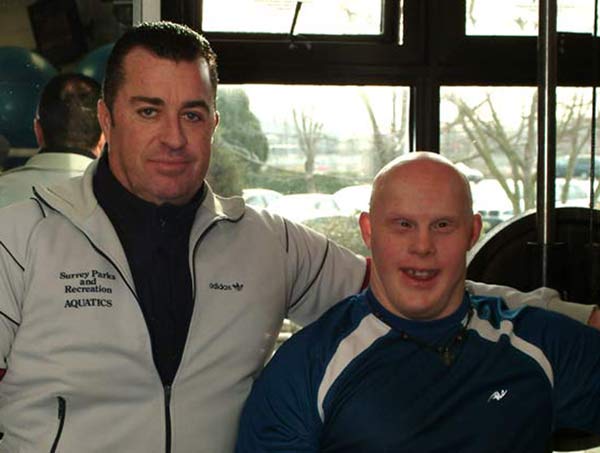
Mark Walsner has turned his job as a one-to-one life skills worker into a life-long friendship with Ken Gabour. (Kirk Darbyshire photo)
Dorothy credits the program with allowing Ken to integrate into the community successfully and progress through elementary school without falling behind. During his time with the IDP, he improved his speech, coordination, and muscle strength, ensuring he would be ready to attend school with other kids his age. The program helps children up to the age of three, who have – or are at risk of having – developmental delays due to biological or psychological issues. Since Gabour was accepted, and helped by the IDP, the program has helped more than 65,000 children in the province. About 61 B.C. children with Down Syndrome are referred to the program every year.
Gabour’s elder sister Colleen Wright smirks slightly as she recalls growing up with him. It was not easy. “It was hard growing up with him,†Wright said. “Despite his disability, he was always the one who accomplished everything and had everyone’s attention. As simply Ken’s older sister, I just kind of got pushed to the side a lot.â€
Gabour graduated from Richmond Senior Secondary School in 1990 before going to Kwantlen College for two years, graduating with a diploma from the restaurant-services program. He turned that diploma into a career that he wouldn’t change for the world. Since graduating from Kwantlen, Gabour has worked at McDonald’s, performing various duties from cooking to cleaning, and assisting customer-service representatives with the taking and filling of orders.
When he’s not working, Gabour can be found training for or competing in one of the many sports he enjoys. He has won medals in both the British Columbia Special Olympics and World Special Olympics in many sports, including floor hockey, swimming, cross-country skiing, softball. The sport he excelled at more than any other is figure skating.
“At an early age Ken set goals for himself, and when he puts his mind to something he wants, there is nothing that can hold him back,†said his mother. “I remember one time when he had won a bronze medal in swimming and he just refused to take it. He had become so used to winning gold that anything less just wasn’t good enough.â€
Ken’s mom, who lost her husband to lung cancer 16 years ago, credits one of the only remaining male influences in his life for much of his success.
Mark Walsner is a one-to-one life-skills worker with the Mainstream Association for Proactive Community Living, and has worked with Gabour for 17 years. He specializes in assisting people with mental handicaps to better understand the community they live in and feel more comfortable with their day-to-day activities.
“We work together to try to reach goals that Ken has set out for himself,†said Walsner, who spends 12 hours a week working closely with him. They do many activities together, such as going to the gym, swimming, watching movies and going to the beach in the summer.
“Over the time I’ve worked with Ken the biggest change I’ve seen in him is in the way he carries himself,†said Walsner. “The increase in his self-confidence and self-esteem is what has allowed him to get to where he is today, and accomplish all the things he has both in sport and life.â€
Walsner’s work has turned into friendship. He and his girlfriend now regularly attend gatherings with Gabour and his family.
Most people with Down Syndrome will never live alone. If something were to happen to Gabour’s mother, he would live in a government-funded group home or with another family member. His sister said she is more than willing to take him in, if that time should come.
“The hardest thing for Ken is change,†said his mother. “He really doesn’t adapt well when things in his life are different then he’s used to.â€
His sister lives in Richmond, so the community that he has spent his entire life growing up in is most likely where he will spend the rest of his life.
“I like Richmond,†said Gabour. “I got my workout, I got my work, and my mom is here.â€
That’s his world.
Junior hockey rivals NHL with more than dollars
January 12, 2010 by Kirk Darbyshire · Leave a Comment
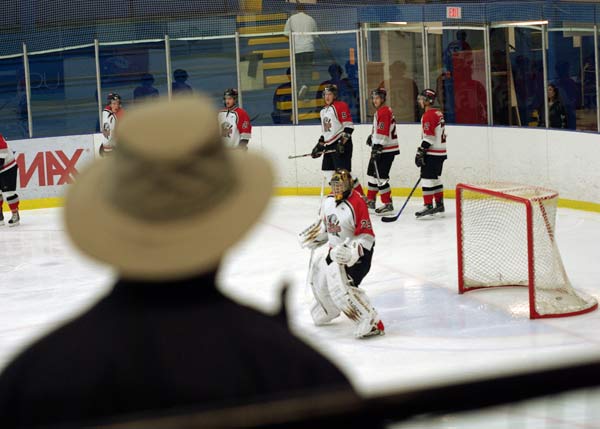
A fan looks on from his cheap seat as the Richmond Sockeyes warm up prior to a PIJHL game at Minoru Arenas. (Kirk Darbyshire photo)
The National Hockey League is not the only place you can find good-quality, competitive hockey in the Lower Mainland, but it is the game that could empty your wallet.
“I would definitely say I come to the Giants games over Canuck games because it’s so much more affordable,†said Mike Pitre, a season-ticket holder since the Giants inaugural Western Hockey League (WHL) season in 2002. “I can still afford to go for dinner before the game and, more importantly, beers after it. It’s so much more fun to be able to make a night of it.â€
Pitre is not wrong in believing he’s saving lots of money by choosing Giants games over those of their professional counterparts. For the price of one regular-season game ticket to GM Place to watch the Canucks – about $130 – you get this: two tickets to a Giants game at the Pacific Coliseum, parking, two beer, two hotdogs, one Giants team Tshirt, one Giants hat, plus $7 and change back in your pocket.
There are three junior hockey leagues in B.C.: the WHL, the British Columbia Hockey League (BCHL), and the Pacific International Junior Hockey League (PIJHL).
The most local and community-based of these is the PIJHL, which has its entire conference of teams located within the Lower Mainland and Fraser Valley. For a long time the PIJHL was considered a league riddled with violence, fights and little skill, but all that’s changing.
“The league has really cleaned its act up in the last few years,†said Mas Morimoto, public relations manager for the Richmond Sockeyes. “It used to be that the players playing in the league were older and at the end of their playing careers. Nowadays we are much more of a developmental league for younger players on their way up.â€
Play quality in all of B.C.’s junior leagues is high. Players are routinely drafted by NHL teams when they turn 18. The good thing for fans of junior teams is that it’s not impossible to get tickets. Unlike Canuck games, for which single-seat tickets are pretty much all that’s available for good games, junior games have plenty of good tickets available for walk-up customers on game days.
The Giants average just under 10,000 fans a game in the Coliseum, which seats 16,281. The Sockeyes play in a much smaller venue at Minoru Arenas, which seats about 1,100. This season, they have averaged about 400 fans a game. Minoru Arenas is a first-come-first-seat facility, so all tickets are general admission. The Canucks have sold all 18,630 tickets to the Garage for every game since Nov. 14, 2002.
Lower-level junior hockey clubs appeal to a sense of community and families, according to Morimoto. Supporting local programs such as Thomas Cook Elementary School breakfast program, which supplies a hot breakfast to kids who otherwise wouldn’t be able to afford one, and raising money for a local firefighter who was injured on the job, leaving him a quadriplegic, are examples of how the Sockeyes have become involved with the community. The Sockeyes support such charities by donating a portion of ticket sales.
Tickets to the Sockeyes games are only $8 for adults and free for any kid wearing a minor-hockey jersey. For roughly the same price as one ticket to a Canuck game plus parking, a father and son could get a season-ticket package and attend all 25 home games of the team of their choice in the PIJHL.
Lucky ones win chance to buy Olympic tickets today
December 14, 2009 by Kirk Darbyshire · 1 Comment

(Left to right) Maggie Fung, executive director of IET, Desiree Yu, public information assistant of marketing and communication, Linda Gomes, executive assistant of finance and administration, oversee Monday's Olympic ticket draw on Surrey campus. (Kirk Darbyshire photo)
If you are a student or employee of Kwantlen, and Monday is your lucky day, you may have gotten a chance to buy tickets to the 2010 Olympic Games.
A total of 1,118 students and 264 employees entered their names in the draw for tickets to the 57 events available to Kwantlen for the upcoming winter games, according to Peter Chevrier, director of marketing and communications for Kwantlen.
People who won the right to purchase tickets were being notified by e-mail late in the day Monday and will have seven days to decide whether to purchase the offered tickets or not.
If the first person passes on the tickets, then they will be offered to a second person, selected by the random number generating computer software, and so on until all tickets are purchased.
Hockey was the most requested event in the draw, with 844 people requesting tickets to the men’s gold medal game. The least requested event was figure skating with only 333 people putting their names forward for tickets the men’s short program.
The draw, which took place on Kwantlen’s Surrey campus, was witness by two people who weren’t participating in the ticket lottery, to ensure accuracy and fairness.


